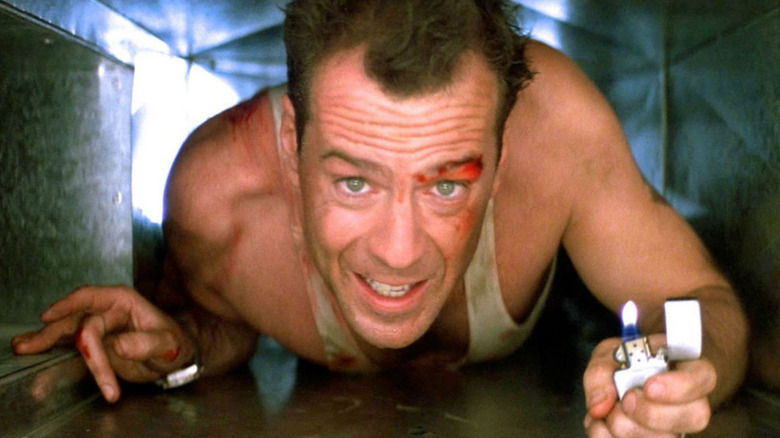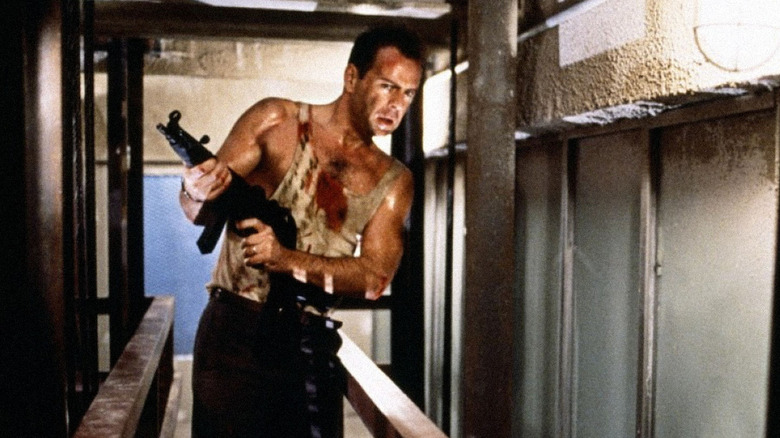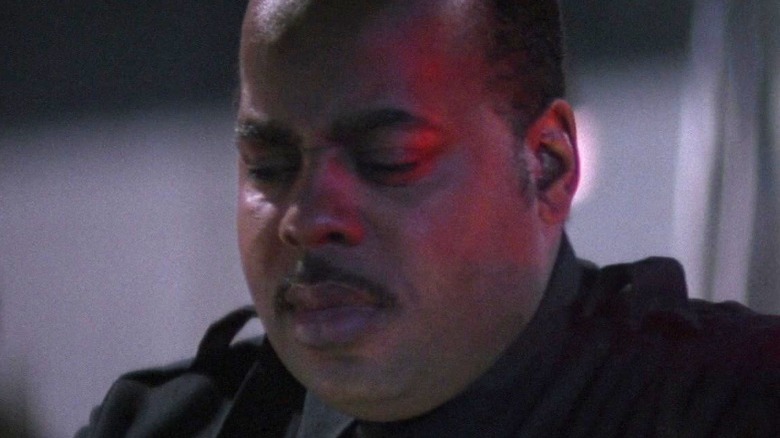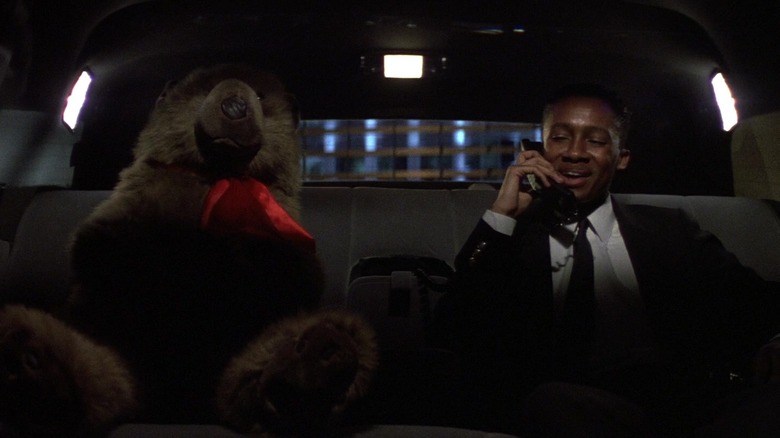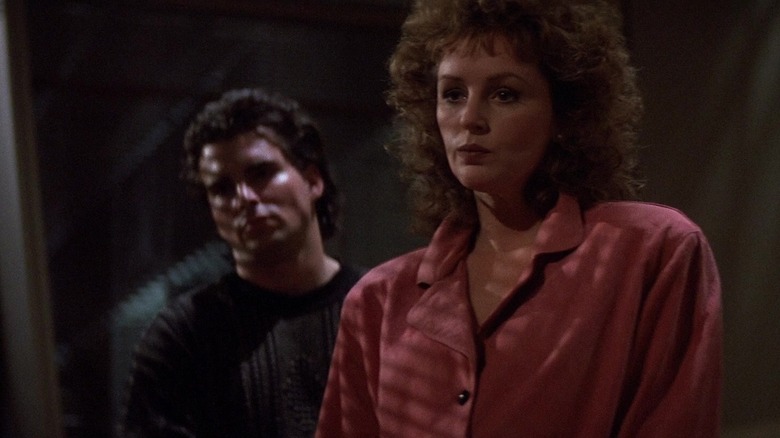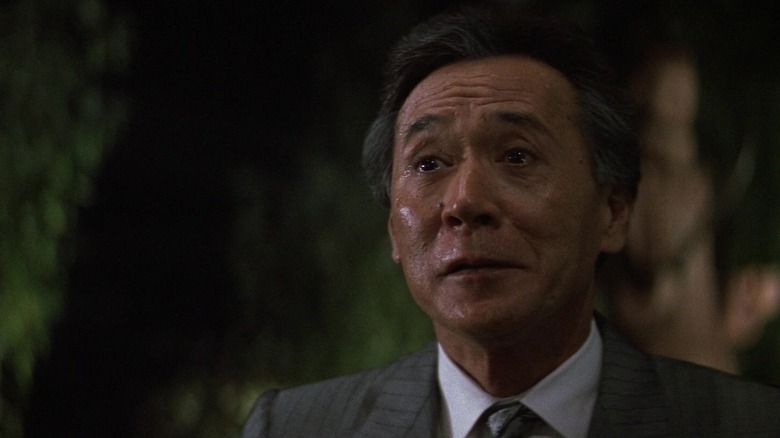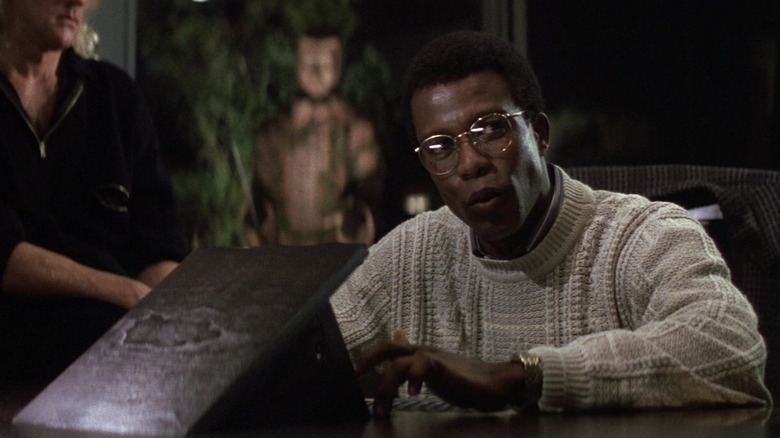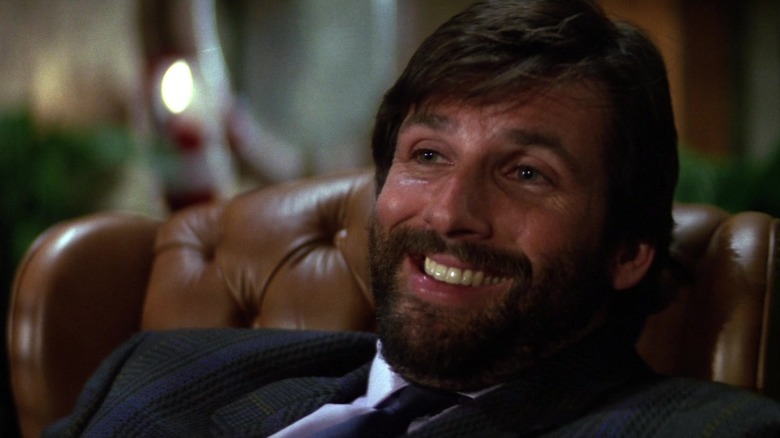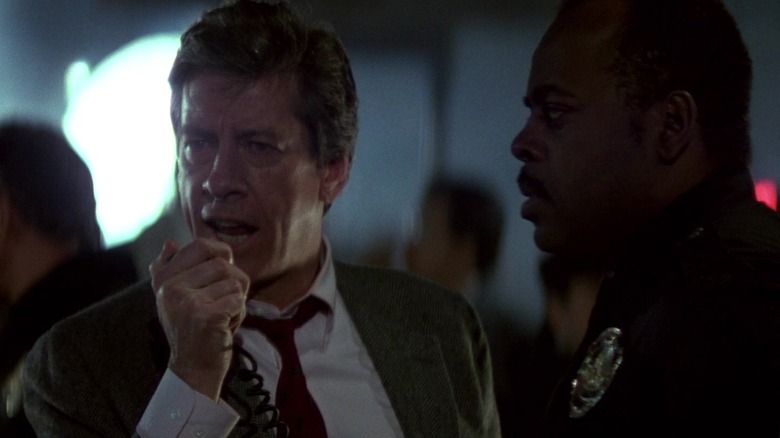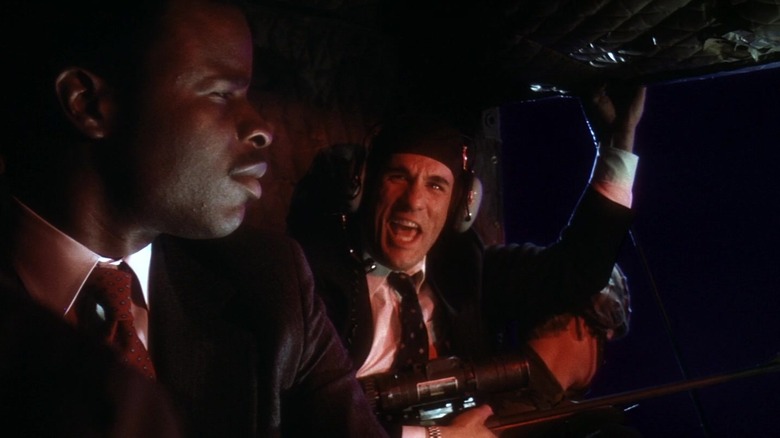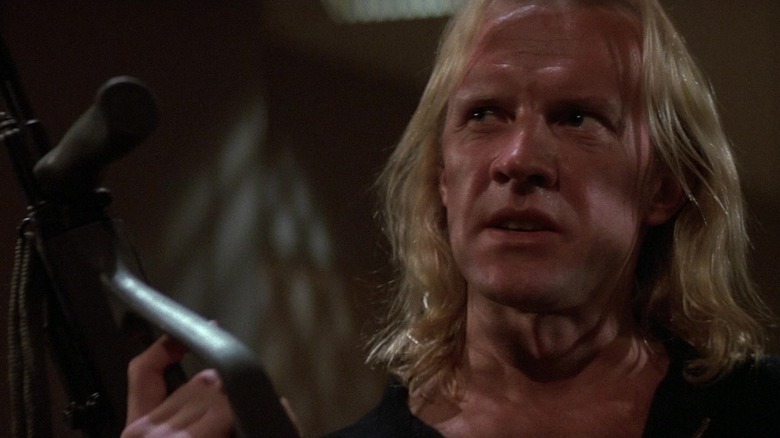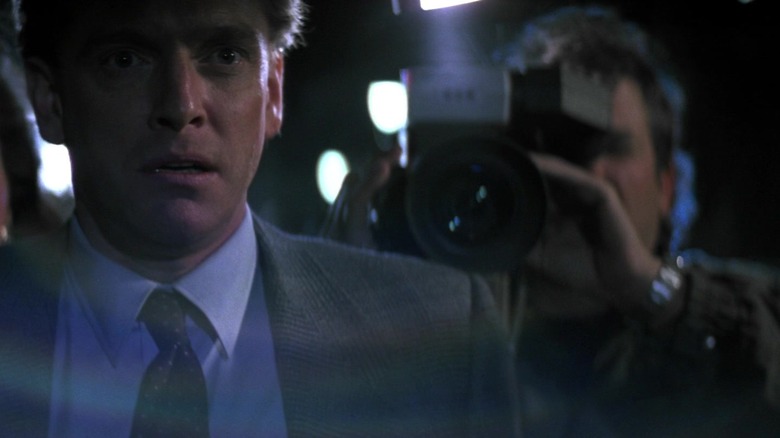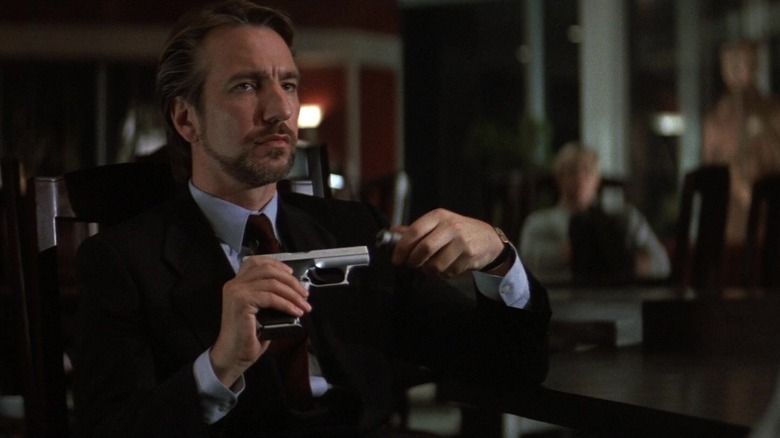Die Hard Characters As Dungeons & Dragons Character Alignments
Beyond the storytelling possibilities afforded by its fantastical settings, the key to any "Dungeons & Dragons" campaign is the diverse field of social dynamics that can emerge from just a few different character archetypes — from rangers and barbarians to rogues and sorcerers — and the color-wheel spectrum of character alignments any player can draw from its four compass points of Chaotic, Lawful, Good and Evil.
And beyond its awesome action sequences, what makes the original "Die Hard" (1988) such a classic popcorn blockbuster is that its cast of characters includes enough distinctly realized personalities for all nine D&D character alignments to be represented onscreen (some more than once, but each time in unique ways).
If you're a player looking for inspiration as you roll up your next character, or a DM casting about for multifaceted campaign scenarios, you could always borrow from one of the best Christmas movies ever made.
John McClane: Chaotic Good
"Just the fly in the ointment ... the monkey in the wrench. The pain in the ass."
The paradox of John McClane (Bruce Willis) is that "Die Hard" is both an unprecedented event in his life, like nothing he's dealt with before, and just another misadventure in the multi-car pileup of his day-to-day existence.
John is a master of self-sabotage in his social interactions, unable to resist letting slip the additional snide remark that ensures a nearly resolved conflict never gets put to bed. And yet, John almost immediately regrets his own immature compulsion to get in the last word, while he also manages to think on his feet — even when he's caught out without shoes — in responding to disasters that aren't of his own making.
When John finds himself facing foes whose resources, skills or plans have him outmatched, he drives them to distraction, zeroing in on where they're most vulnerable to irrational irritation.
Although he arrives in Los Angeles a meat-and-potatoes traditionalist regarding the gender roles of marriage, John grows up and tearfully acknowledges he should have supported his wife in achieving the career goals that mattered to her.
Even as a blue-collar New York cop who's constantly thrown off-balance by the relatively modern social mores of California, John McClane is an old dog who's still capable of learning new tricks, as when he realizes his fellow flight passenger was right: Making fists with your toes really does take the edge off air travel.
LAPD Sgt. Al Powell: Neutral Good
"When you're a rookie, they can teach you everything about being a cop, except how to live with a mistake."
Imagine a cop you'd trust implicitly to keep your kids safe, and someone like Sgt. Al Powell (Reginald VelJohnson) is likely who'd come to mind — an avuncular caregiver with a soulful stare and a gift for listening, deeply and attentively, that makes people feel genuinely heard.
Which makes it all the more tragic that Al's street duty ended because he accidentally shot a 13-year-old, after mistaking the boy's toy laser pistol for an actual firearm in the dark, in a case literally ripped from the headlines of the year prior to the premiere of "Die Hard."
Given he's still allowed to drive a patrol car, even on self-described "desk jockey" status, Al was presumably found to have acted appropriately under the circumstances, but he holds himself to a higher standard, enough that he hasn't been able to draw his gun on anyone since (until the moment when it matters most).
Al prefers not to pick fights, even when defending John McClane to those who outrank him, prefacing his objections to their conjecture with frustrated refrains of "Excuse me, sir!" Nor does he impose his own preconceived notions upon his situational assessments.
Both traits make Al Powell a perceptive, detail-oriented observer, who knows when to listen, when to shut up ... and when to pray.
Argyle: Neutral Good
"Of course I'm still coming by later. Sweetheart, have I ever lied to you?"
Although his assurances to his unseen girlfriend are proven false, when terrorists take the Nakatomi Plaza hostage, it doesn't mean he's insincere in offering them.
Argyle (De'voreaux White) is a good-hearted kid, who's more than willing to admit when he's out of his depth, but he still tries to do what's right, albeit as best he knows how.
When he picks up John McClane from the airport, it's Argyle's first time driving a limo, so he falls back on his experience driving a cab, by engaging John in what's meant to be friendly chit-chat. None of that driving experience prepares him for John opting to sit up front alongside him, but he's willing to roll with it, so long as John is willing to put up with some passenger-side mess.
Argyle might not be a yuletide traditionalist, but he still believes in ringing in the season, even if it is with Run-DMC's "Christmas in Hollis."
While Argyle doesn't hold back in calling John out on his relationship drama with his wife, he also preemptively offers to wait in the parking lot, and find John a hotel if he strikes out with Holly.
Argyle even foils the escape of Hans Gruber's cleverest henchman, Theo, by T-boning his van and delivering a one-punch knockout blow.
Holly Gennero McClane: Lawful Good
"You murdered my boss. Now everyone's looking to me. Personally, I'd pass on the job. I don't enjoy being this close to you."
Climbing the corporate ladder was tough enough as a woman in the 1980s, never mind a married American woman working for a Japanese-owned company.
Holly McClane ascends as high as she does because she's learned when to assert herself, versus when to go with the flow of the corporate culture's unwritten rules, which led her to drop her married name and have "Holly Gennero" embossed on her office door instead.
Ironically, Holly's marriage to John gave her plenty of practice in both not backing down and recognizing when to table certain disputes for the good of the order.
When Joseph Takagi is killed, and her coworkers are threatened by terrorists, Holly knows no one else can speak up for her fellow hostages, so she bluntly puts forward their needs to Hans Gruber, forcefully yet rationally articulating how and why specific steps need to start happening.
To her surprise, Hans proves receptive to her reasoning, within the bounds of his own schemes' requirements, and a moment of what could almost be deemed respect passes between the curtly mannered antagonists.
At the same time, when she witnesses one of Karl's tantrums, a smile can't help but spread across her face. "Only John can drive somebody that crazy," Holly chuckles, reminded of why she's infuriated and infatuated in equal measure with her sharply contrasting partner.
Joseph Yoshinobu Takagi: Lawful Good
"I'm telling you, you're just going to have to kill me."
During the 1980s, one thing liberals and conservatives alike could agree upon was villainizing Japanese corporations, which makes Joseph Yoshinobu Takagi (James Shigeta) an astonishing character for his era, since he was a Japanese salaryman recast as a Captain America-level paladin.
Screenwriters Jeb Stuart and Steven E. de Souza take time to point out Takagi was interned at Manzanar from the ages of 5-6, and his appearances during the Nakatomi Christmas party underscore his generosity toward his workers.
Takagi earned his law degree from Stanford at 25 and his MBA from Harvard at 33, back in the 1960s and '70s, so he endured a lot of racism on his way up the ladder, which made him all the more invested in helping Holly Gennero advance in her own career.
Takagi even tolerates Harry Ellis' coke-addled shenanigans, and not only covers John McClane's limo ride to the Nakatomi Plaza, but also shrugs off John's low-key itching-for-a-fight wisecrack, about celebrating Christmas in Japan, with the shockingly self-effacing comeback, "Pearl Harbor didn't work out, so we got you with tape decks."
And when Hans Gruber calls him out, Takagi literally stands up for his employees, then stays loyal to his employers, even with a gun to his head, delivering a final line worthy of any action hero.
Theo: Chaotic Neutral
"You didn't bring me along for my charming personality."
Of all Hans Gruber's henchmen, Theo (Clarence Gilyard Jr.) is the most compelling for how his patience gives way to his playfulness. A smooth operator whose worker-bee productivity is well-suited to Hans' fastidious professionalism, Theo nonetheless wears the worryingly fixed grin of the little kid in the music room who's willing to wait for his turn on the drums, just so he can kick out an absolutely cacophonic solo.
Theo knows his limits and his value to the team, even though he's not quite a team player. He prefers to work either by himself or in charge of Hans' other henchmen, but it's not alpha male posturing: He manages to get along well with the otherwise temperamental Karl, enough for them both to draw Hans' silent ire, by betting on whether Takagi would refuse to surrender the code for the vault.
And once Theo becomes "the eyes" for the team's coordinated counterstrikes to repel the LAPD's less-than-stealthy assault, his gleeful running commentary is like listening to an excited 8-year-old blurt out a breathless blow-by-blow recount of his favorite Godzilla film.
Since Theo was the only Nakatomi terrorist confirmed to survive, it wouldn't surprise me if the NSA eventually offered him a deal, to attack black-hat hackers with as much relish and aplomb as he did the LAPD.
Harry Ellis: True Neutral
"You use a gun. I use a fountain pen. What's the difference?"
Harry Ellis (Hart Bochner) is such a quintessentially '80s scumbag that his only regret is having Boneitis, and yet, he's not the worst person in this film.
He's unabashedly bigoted and laughably overconfident in his ignorance, but even his most catastrophically thoughtless deeds — such as outing John McClane's identity to the terrorists he's been picking off — aren't actually malicious in intent.
For all his cocaine-fueled braggadocio, Harry Ellis essentially wants to get along with the rest of whatever room he's in, and if that means casually tossing out racial epithets to pander to whatever anyone else's prejudices might be, then he couldn't care less, so long as he's able to close whatever self-serving deal he's jockeying to negotiate.
He feels no need to mention Holly Gennero is John McClane's estranged wife, because Holly seems to keep her mouth shut whenever Harry powders his nose or sexually harasses her, so he's inclined to return the favor. Besides, involving her would draw attention away from himself, for brokering what he naively believes is sure to be a mutually amicable truce between John and the terrorists.
Even when he outs John's identity, Ellis doesn't seem to harbor any ulterior motives of hooking up with Holly, because he's earnestly bought into Hans Gruber's spiel that everyone can walk out of the Nakatomi Plaza alive, if they so choose.
LAPD Deputy Chief Dwayne T. Robinson: Lawful Neutral
"I don't know who in the hell you think you are or what you're doing, but you just destroyed a building!"
Deputy Chief of Police Dwayne T. Robinson (Paul Gleason) is a petty, small-minded man who insists upon his own authority. In another life, he might have been a high school vice principal who got his power-tripping kicks from bullying the students in weekend detention.
He's not especially street-smart or intuitive, which might be why he's so resentful of those who are (such as the back-sassing patrol sergeant who first called for backup at Nakatomi Plaza), and why he's so eager to defer to even higher authority than his own, as when the FBI finally takes charge of the emerging situation.
Even when the leader of the hostage-takers dictates which of his so-called "comrades-in-arms" around the world should be released, Robinson appears relieved to be reduced to errand-boy status, since it allows him to focus on running down a simple list of names.
And while he's mildly distressed by civilian casualties — "I hope that's not a hostage," he says, as Hans Gruber falls from the Nakatomi Tower — what Dwayne Robinson really can't stand is John McClane, who's not part of his chain of command, can't be brow-beaten into compliance, and worst of all, humiliates him on national TV.
No wonder Robinson wants to debrief McClane, even (especially) after he saves the hostages.
FBI Agents Johnson & Johnson: Lawful Neutral
"Figure we take out the terrorists, lose 20, 25% of the hostages, tops."
"I can live with that."
FBI Agent "Little" Johnson (Grand L. Bush) and Special Agent "Big" Johnson (Robert Davi), no relation, do not care about you.
They don't care if you're the one who's in charge of the crime scene — "Not anymore," Big Johnson tells Dwayne Robinson, immediately upon his and Little Johnson's arrival — although they will try to let you know when they commandeer your men.
They don't care if, like John McClane, you're the reason that a) they have the information they have, walking onto the scene, or that b) they're starting off facing seven terrorists instead of 12.
They don't care that cutting power to the Nakatomi Plaza will take out a whole city grid of 10 square blocks in Century City, Los Angeles, on Christmas Eve.
They don't even care about saving the lives of more than three-quarters of the remaining hostages, as noted above.
Because all Johnson and Johnson do care about is the Universal Terrorist Playbook, which they plan on running step by step, under the one-size-fits-all assumptions that all terrorists are alike, and that Hans Gruber is no different from any other terrorist.
Karl: Chaotic Evil
"I don't want neutral. I want dead."
There's a reason why Karl (Alexander Godunov) is only second-in-command of the Nakatomi heist.
Karl has the will and ability to lash out with effectively intimidating violence, as well as the sheer stature, to meet the needs of a team leader's enforcer ... but he also has absolutely zero chill, especially after his brother and fellow terrorist, Tony, is killed by John McClane.
What's funny is, for all his vengeful rage at John, Karl shows no signs of liking or respecting Tony when he's still alive. Karl even takes a chainsaw to the phone lines of the Nakatomi Plaza, while Tony is still manually patching those same lines. While the sudden disconnection of his phone conversation with Argyle in the limo is John's first clue that something has gone awry, Karl flashes a smug, malicious smirk at Tony, who stares up in silent fury at his departing brother.
Because Karl is gratuitously cruel, and when he's deprived of an outlet for his mean streak, he tends to break things, and people, and — worst of all, from Hans Gruber's standpoint — he stops following The Plan.
Which makes Karl almost impossible to bring to heel, because if you were one of Hans' other henchmen, would you stand in the way of the towering Aryan nightmare whose flowing blonde locks trail after him in the wind, like the wings of the Angel of Death?
Richard Thornburg: Neutral Evil
"Tell me you got that!"
As a journalist, this is a declaration against interest, but Richard Thornburg (William Atherton) is the worst person in this film, not only for practicing "If it bleeds, it leads" journalism, but also for alternatively gaming the system and throwing the whole rulebook out the window, depending on whichever works.
While Hans Gruber subscribes to what's admittedly an amorally homicidal meritocracy, Richard Thornburg is simply an entitled whiner. We first see him pleading with his date, claiming he can get them a table at Spago ("Wolfgang (Puck) and l are very close friends," he tells her over the phone), and when his boss initially refuses to assign him a news van to cover reports of shots fired at Nakatomi Plaza, he threatens to steal one, causing an on-air disruption during his station's nightly newscast.
Richard Thornburg even manages to do more damage than Harry Ellis by connecting the dots between John McClane and Holly Gennero for Hans Gruber, when John and Holly's grade school-aged daughter appears on TV to speak to her parents (which Thornburg obtains via dubious consent, by blackmailing Holly's housekeeper with the prospect of deportation).
When John blows up the floor of the Nakatomi Tower from which the terrorists are slaughtering the LAPD, Dwayne Robinson grouses about broken glass, but for Richard Thornburg, the spectacle of death and destruction is mere fodder for his station's ratings.
Hans Gruber: Lawful Evil
"I'm going to count to three. There will not be a four."
Even as reporters rush to catch up on why Hans Gruber (Alan Rickman) is no longer affiliated with "the radical West German Volksfrei movement," Hans is sharing his motivations and life story with anyone who will listen at the Nakatomi Plaza.
Hans loved making models as a boy, because they appealed to his affinity for precision and attention to detail, while his "classical education" instilled in him such respect for knowledge that he's sought to remain well-informed on a broad spectrum of world news, through a wide variety of media sources.
Hans believes in doing his homework, anticipating every eventuality, and adhering to The Plan. And yet, when confronted with logical considerations that he hadn't factored in (as when Holly Gennero mentions a pregnant hostage's need for a sofa, and suggests trips to the restroom for the hostages as a whole), Hans incorporates those solutions into The Plan without hesitation.
However much Hans plays at being civilized, he's still willing to commit mass murder to score a fortune from the Nakatomi vault, which he justifies by rationalizing how he deserves to win, since none of his victims have invested his levels of hard work and intellectual vision into their own lives.
Which makes it so maddeningly irksome for Hans to have his plans undone by a tank top-wearing, self-styled cowboy, whose only discernible skills seem to be improbably lucky improvisation, and surprisingly stinging postadolescent quips.
